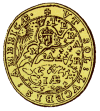
Court of Appeals
A commission sent with royal governor Francis Nicholson established the Court of Appeals in 1694. Prior to 1681, the governor and members of the Council, who constituted the upper house of the Assembly, exercises appellate jurisdiction much as the House of Lords did in England. Appeals were not uncommon, despite the fact that the governor and Council sat as the judges of the Provincial Court where the appealed cases originated. This redundancy and questions about the legal right of the upper house of the Assembly to hear appeals became such an issue that no appeals were heard between 1681 and 1694. Governor Nicholson's commission reestablished the upper house of the Assembly, now sitting as the Court of Appeals, as the colony's highest appellate court. To blunt criticism of their dual judicial roles, the practice developed where a Council member would not sit on the Court of Appeals when it heard a case in which he had sat as a trial judge. The last colonial court of appeals sat in May 1776. The Constitutional Convention later that year provided for a Court of Appeals to hear cases from the General Court, Chancery Court, and Admiralty Court. The first Assembly to meet after the adoption of the state constitution decreed that the tribunal would have five appointed judges who could hold no other office. Reorganization of the Court of Appeals after the abolition of the General Court in 1805 provided for election of judges by voters from six judicial districts. The court assumed the appellate jurisdiction of the former General Court and the practice of holding sessions on both the Eastern and Western shores. The Constitutional Convention of 1851 eliminated the Eastern Shore sessions and required the court to issue and publish opinions on every case it decided. The constitutions of 1851, 1864, and 1867, as well as legislation passed in 1943, successively altered the number and method of selection of judges. As of 1960, the court has consisted of seven judges appointed by the governor, who hold office until the next general election when the voters decide whether or not to retain them. The governor designates the chief judge. In 1806 the Court of Appeals took over from the General Courts the maintenance and indexing of land record abstracts and the recording of land records filed directly. The latter activity ceased by 1826. In 1874, the abstract functions, a security measure in case local records were lost or destroyed, became the responsibility of the Land Office. The Court of Appeals hears cases almost exclusively by way of certiorari (i.e., on review). The court may review cases decided by the Court of Special Appeals or may bring up for review cases filed in that court before they are decided there. The Court of Appeals may also review certain decisions rendered by the circuit court if the latter acted in an appellate capacity with respect to an appeal from the District Court. The court may adopt rules of judicial administration, practice, and procedure that have the force of law. It reviews recommendations of the Board of Law Examiners and conducts disciplinary proceedings involving members of the bench and bar. The court also supervises the Attorney Grievance Commissions and admits persons to the practice of law (Code Courts and Judicial Proceedings Article, secs.12-301 through 12-397).